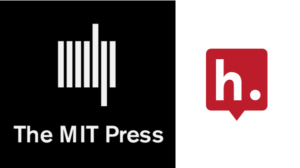MIT Press Integrates Hypothesis Annotation in CogNet
 MIT Press is adding Hypothesis annotation to their CogNet platform to offer collaboration tools to researchers in the brain and cognitive sciences. Enabling standards-based, interoperable workflow tools across CogNet provides authors and readers with robust annotation to streamline their research processes. In conjunction with the Hypothesis team, MIT Press will offer education and training for internal and external stakeholders to help them make best use of annotation capabilities.
MIT Press is adding Hypothesis annotation to their CogNet platform to offer collaboration tools to researchers in the brain and cognitive sciences. Enabling standards-based, interoperable workflow tools across CogNet provides authors and readers with robust annotation to streamline their research processes. In conjunction with the Hypothesis team, MIT Press will offer education and training for internal and external stakeholders to help them make best use of annotation capabilities.
“The MIT Press is always looking to push the boundaries of experimentation in our digital publishing efforts, and so becoming an early adopter of the Hypothesis annotation tool was a no-brainer for us,” said Press Director Amy Brand. “We’re really excited to track how the tool gets used in the context of our CogNet platform.”
Launched in 2010, CogNet has proven itself an invaluable tool for research in the study of the nature of the human mind. Now encompassing the full text of more than 700 books, numerous research works, and six MIT journals, CogNet also includes tools for authors and librarians.
A mission-driven, open-source annotation technology organization, Hypothesis works with publishers, educators, researchers and journalists to bring annotation to the web. By embedding the tool in the CogNet site, the MIT Press makes it easier for readers to explore content added by authors or experts, including updates and supplemental materials, as well as to participate in threaded conversations tied to specific text atop the publisher version of record. Hypothesis annotation supports rich media, deep-linking to additional content across the web, and easy creation of groups for collaboration or teaching purposes.
“Amy and MIT Press are leaders in the university press world, and we’re delighted that they’ve chosen to offer open-source, standards-based annotation with Hypothesis — the tool that researchers can use to annotate content anywhere on the web,” said Heather Staines, Director of Partnerships at Hypothesis. “We look forward to continuing to work with them to extend it’s capabilities further and leverage the utility of annotation for more use cases within the press and their scholarly community.”
Visit CogNet to learn more about their rich content and tools and contact Hypothesis to learn more about enabling a conversation layer across your content, including the ability to create a publisher-branded moderated layer for your readers.